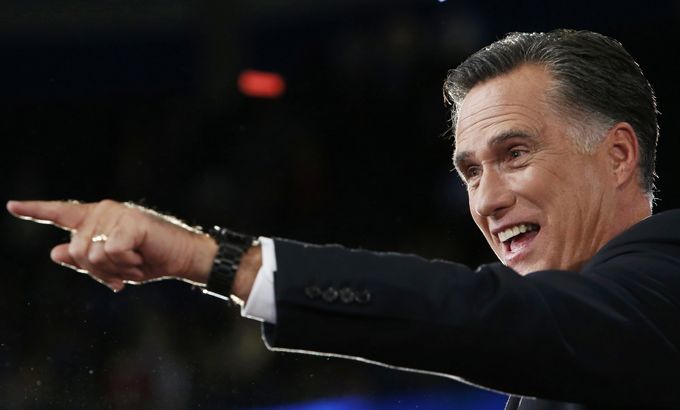
Romney: ‘Restoring the promise of America’
Romney has formally accepted his party’s nomination for the US presidency, but can his policy plans convince voters?
Mitt Romney has formally accepted his party’s nomination for the US presidency, but what do we really know about his policies?
|
“All of this is so much theatre designed to win the election. And what comes later will depend on the pressures and the realities …. Then we are left with a Mr Romney, where we have no idea where he actually is going to go and that may well be because he doesn’t either.” – Richard Wolff, a professor of economics at University of Massachusetts-Amherst |
It was a speech he had been waiting six years to deliver – and now having finally officially become the Republican party’s nominee, Mitt Romney’s specific policy proposals should come under particular scrutiny ahead of November’s election.
Keep reading
list of 4 items‘Triple spending’: Zimbabweans bear cost of changing to new ZiG currency
Boeing hit with 32 whistleblower claims, as dead worker’s case reviewed
US imposes new sanctions on Iran after attack on Israel
His address attempted to appeal to the Republican faithful, with much talk of religion, family life and “restoring the promise of America”.
Some of the biggest cheers came for his criticism of Barack Obama, the US president, and his policies.
As for how he would pull the US out of economic stagnation, details were few, although Romney has sketched out his plans for jobs, energy and trade.
Romney released his “More Jobs and More Take-Home Pay” plan at the beginning of August.
The one-page document claims the Romney campaign will create jobs and increase salaries by focusing on:
- Energy independence – an increase in domestic energy production and the deregulation of mining and drilling
- Deficit reduction through, amongst other measures, capping federal spending to 20 per cent of GDP, although defence spending would increase to 4 per cent of GDP
- International trade and hitting hard at China
- Championing small business through reducing corporate taxes
- Repealing president Obama’s healthcare reform, deregulation and fighting the unions
- Access to job training and education
|
“Americans are afraid they are going to end up in something like Japan went through, the lost decade where the growth never comes. And if it’s Obama that can convince them he’s got something in him that can find that growth, he is going to win. Romney the same way.” – John Nichols, a political writer for The Nation magazine |
But experts with the Economic Policy Institute and the Tax Policy Center say this plan and the one released in June does not contain enough specifics for adequate evaluation.
Romney said that his plan would create 12 million new jobs by 2016, essentially 250,000 jobs a month. But Moody’s Analytics projects that the economy is already on track to add 12 million jobs in the next four years.
In his speech, Romney also defended his earlier career in business, credentials that he says give him the know-how to get the country thriving again.
But with his time at Bain Capital coming under increased criticism precisely for its business practices, is it really time for a businessman to be US president?
What have we learned about Mitt Romney’s policies from the convention?
Inside Story US 2012 discusses with guests: Richard Wolff, a professor of economics at the University of Massachusetts-Amherst; John Nichols, a political writer for The Nation magazine; and Joe Watkins, a Republican strategist.
|
“He’s not just the guy that’s been defined by President Obama’s campaign … he is more than a business man, he is somebody who is warm, who has a heart, who cares about people, who loves his family and who really wants to put America back on track – and has the programme to do it.” Joe Watkins, a Republican strategist |